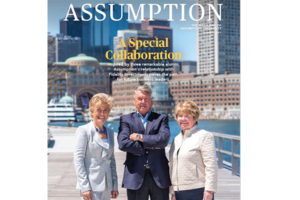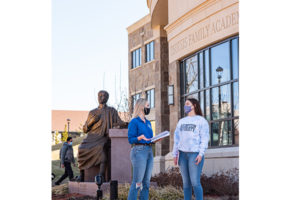 By Gianfranco Cesareo
By Gianfranco Cesareo
Thomas Jefferson once said that an “educated citizenry” is the best safeguard of American liberty. True to Jefferson’s ideal, an Assumption education is built upon fostering critical intelligence with the goal of creating educated and thoughtful citizens. It is with this goal in mind that Associate Professor of History Deborah Kisatsky, Ph.D., developed the new course, “Secret Wars of the CIA and KGB.”
In this course, students examine the lesser-known dimensions of American and Soviet foreign policy throughout the 20th century, specifically ways in which the United States and the Soviet Union used covert methods as they competed for power and influence across the globe. It is Prof. Kisatsky’s intention that by learning new details about the history and actions of their own government, as well as the governments of other countries, students might come to have a clearer understanding of the world they inhabit and be better equipped to contemplate their rights and responsibilities as citizens.
“This class helped me become an educated citizen because I engaged with history that is generally not spoken of in this country,” said Jenna Smith ’20, a dual history and political science major. “I know that the CIA was a controversial organization, but I had never had the chance to explore why until this course was offered. This class forced me to challenge my opinions regarding the government and its activities throughout the world.”
Prof. Kisatsky said that, although students are assigned voluminous reading and often engage with complex texts, their engagement is astounding. “Just about every day, someone would ask me a question that I could not answer. … I learned alongside my students, and every time we confronted a historical puzzle, we made new discoveries in our efforts to solve it.”
History major Chloe Amour ’21 said the readings from different perspectives enriched the class, making for rich discussions that allowed students to draw connections. “This class furthered my critical thinking skills, as I was pushed to think deeply about the drive and purpose behind covert actions,” she said. “By the end of the semester, I had a much stronger understanding of foreign relations and government methodology.”
Prof. Kisatsky said classes like this are important because they expand students’ understanding of the world. “If I could have my students take away one thing from this course, it would be the recognition that foreign policy has consequences, not only for inhabitants of one’s own country, but also for people around the world – and that there is often a lot more history than meets the eye in international relations,” she added.
The course focuses on the ways that the United States and Soviet Union – through the CIA and KGB – pursued influence in countries across the globe through regime change, assassinations, election meddling, espionage, propaganda, bribes, political infiltration, interrogation, and sabotage. Students also examine the aftermath and legacies of these secret wars. While there were success stories, these struggles often led to unintended consequences that ultimately worked at cross-purposes with the intended outcomes. By studying this past, students can better navigate the challenges their nation and world face today.
History and political science major Michael Turaj ’20, who plans to pursue a career in United States foreign policy, governmental affairs, and statecraft, has “been shaped and inspired” by the classes he has taken with Prof. Kisatsky. Turaj said that classes like these encourage “civil participation and critical thinking in the current political atmosphere” and that Prof. Kisatsky provides a “positive foundation for learning” by fostering critical intelligence. “Students can provide their own view about current issues,” he said, and become “better writers, scholars, and citizens.”


